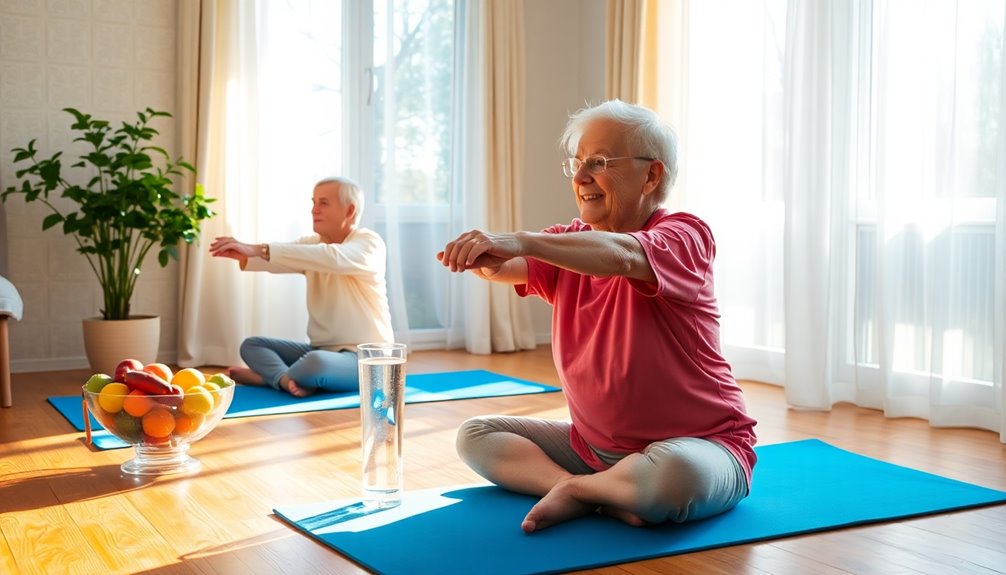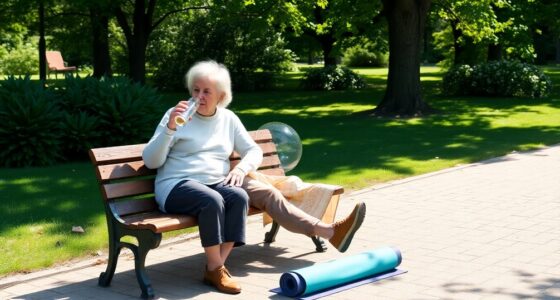To maintain wellness in seniors, focus on regular exercise, balanced nutrition with whole foods, and quality sleep. Stay active with strength training and hydration to boost health. Engage in mentally stimulating activities and build strong social connections to enhance your well-being. Don’t forget to create a safe home environment to prevent falls. These essential health tips can make a big difference in your life. Discover more strategies to support your overall health and happiness. Additionally, consider incorporating mindfulness practices such as meditation or yoga, which can help reduce stress and improve mental clarity. Participating in group activities or classes can foster community engagement and enhance senior living wellness, allowing for meaningful interactions. By prioritizing these elements, seniors can not only improve their physical health but also enrich their emotional and social well-being.
Key Takeaways
- Engage in regular physical activity, including strength training, to reduce the risk of chronic diseases and improve overall wellness.
- Maintain a balanced diet rich in whole foods and stay hydrated to support physical health and cognitive function.
- Foster social connections and participate in community activities to enhance mental health and combat loneliness.
- Prioritize quality sleep by establishing a consistent routine and creating a calming environment to support cognitive abilities.
- Schedule regular health check-ups and screenings to monitor conditions and ensure proactive management of age-related health issues.
Importance of Regular Exercise
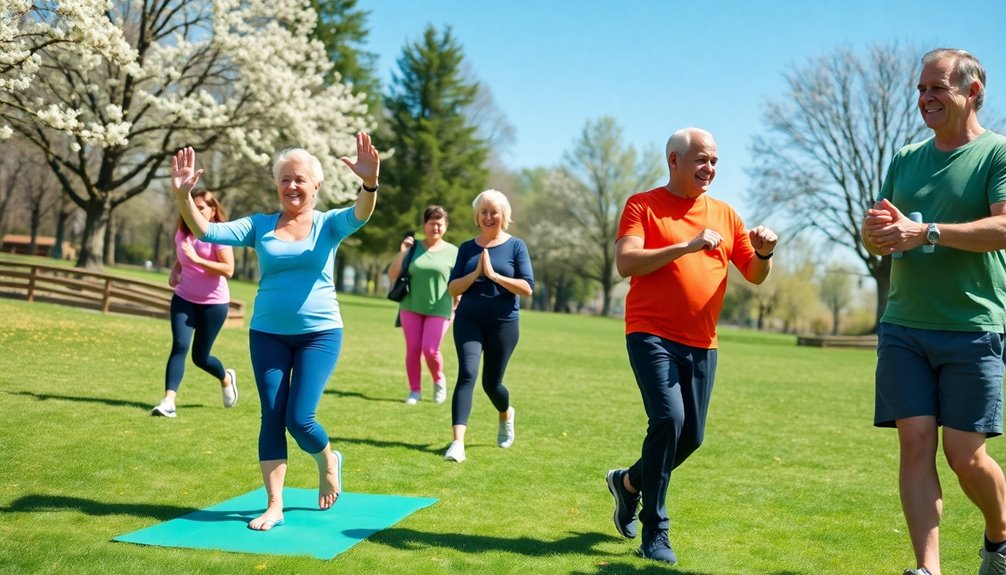
While you may think that exercise is just for the young, it's actually crucial for seniors too. Regular physical activity plays a vital role in preventing diseases like heart disease and diabetes by boosting your immune function. Engaging in exercise can also help support healthy kidney function, which is particularly important as we age.
Even light exercises, like walking, can significantly help manage these risks. Moreover, staying active reduces the chances of chronic conditions such as hypertension and certain cancers. It also improves your blood sugar levels and keeps your blood pressure in check.
Consistent exercise can lower the risk of dementia and cognitive decline, enhancing your overall mental sharpness. Additionally, engaging in exercise helps foster a positive mindset and emotional well-being, which is essential for maintaining overall health.
Nutrition: Focus on Whole Foods

When it comes to nutrition, focusing on whole foods can make a significant difference in your health as a senior. Whole foods, like fruits, vegetables, whole grains, lean proteins, and dairy, provide essential nutrients and antioxidants that support your overall well-being. They help reduce the risk of chronic diseases such as heart disease and diabetes while improving muscle health and strength. Plus, whole foods are more satisfying, giving you sustained energy throughout the day. Eating a balanced diet is crucial for ensuring you receive all the necessary nutrients your body needs. Aim for a balanced diet, incorporating a variety of these foods. Additionally, incorporating diversified investments in your meal planning can help ensure you are getting a range of different nutrients. Plan your meals to avoid processed options and ensure you're getting adequate hydration. Discuss any dietary changes with your healthcare provider to tailor your nutrition to your needs.
Strategies for Mental Health Maintenance

To maintain your mental health, focus on building social connections with family and friends, which can help combat loneliness. Get involved in community events or volunteer to foster a sense of purpose. Engaging in group activities, like clubs or classes, is another great way to connect with others.
Challenge your mind with puzzles, games, or new hobbies to keep it active. Regular physical activity, such as walking or yoga, boosts your mood and cognitive function. Additionally, ensuring you get adequate sleep is crucial for mental well-being, as newborn sleep patterns can inform us about the importance of rest at any age.
Lastly, practice mindfulness and consider professional support when needed to manage stress effectively. These strategies will help you maintain your mental health and overall wellness.
The Role of Quality Sleep

As you age, the importance of quality sleep becomes increasingly evident, impacting both your physical and mental health. Changes in your circadian rhythm may lead to earlier bedtimes and more frequent awakenings during the night. You might notice a decrease in deep sleep and REM sleep, resulting in lighter, fragmented rest. However, you don't necessarily need more sleep; you need better quality sleep.
Prioritizing quality sleep can boost your immune function, enhance cardiovascular health, and improve cognitive abilities. To foster better sleep, establish a consistent routine, create a calming sleep environment, and incorporate relaxation techniques. Additionally, decreased deep sleep can lead to increased daytime fatigue, making it essential to address sleep quality for overall well-being. Engaging in regular physical activity can also contribute to improved cognitive abilities by promoting better sleep patterns.
Building Social Connections
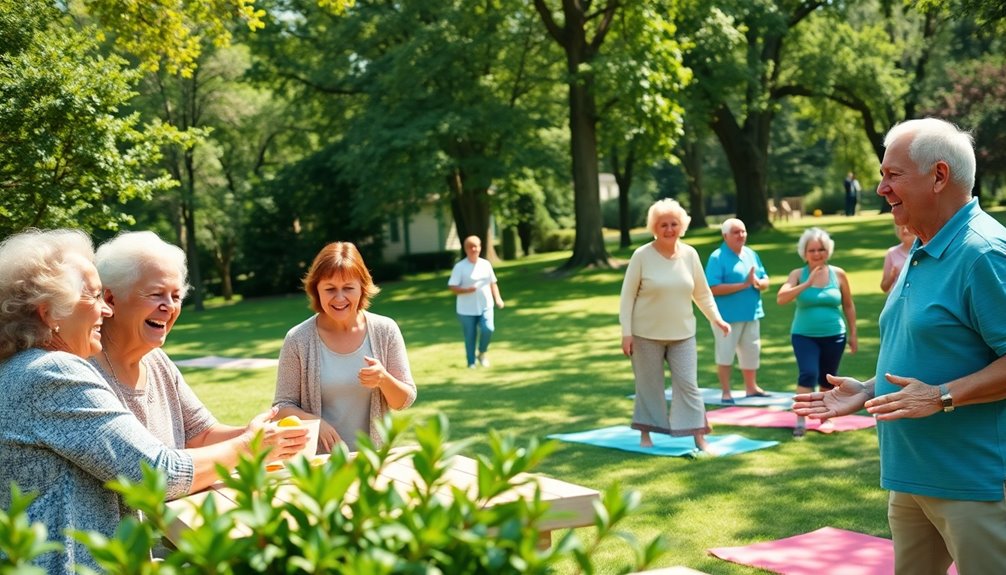
Building social connections is vital for your overall well-being, especially as you age. Strong relationships can reduce cognitive decline by up to 70%, improve mental health, and enhance physical health. Maintaining strong social connections can significantly lower the risk of dementia, making it crucial for your cognitive health. Engaging in social activities also promotes emotional regulation, which can help you manage stress and improve your interactions with others.
By being socially active, you'll likely enjoy better cardiovascular health and lower blood pressure, contributing to a longer life.
To foster these connections, join community activities or volunteer, as both can introduce you to new friends. Don't overlook your neighbors; they can be a great source of companionship.
Additionally, practice mindfulness to enhance your interactions and prioritize healthy eating to boost your energy.
Preventive Healthcare Measures
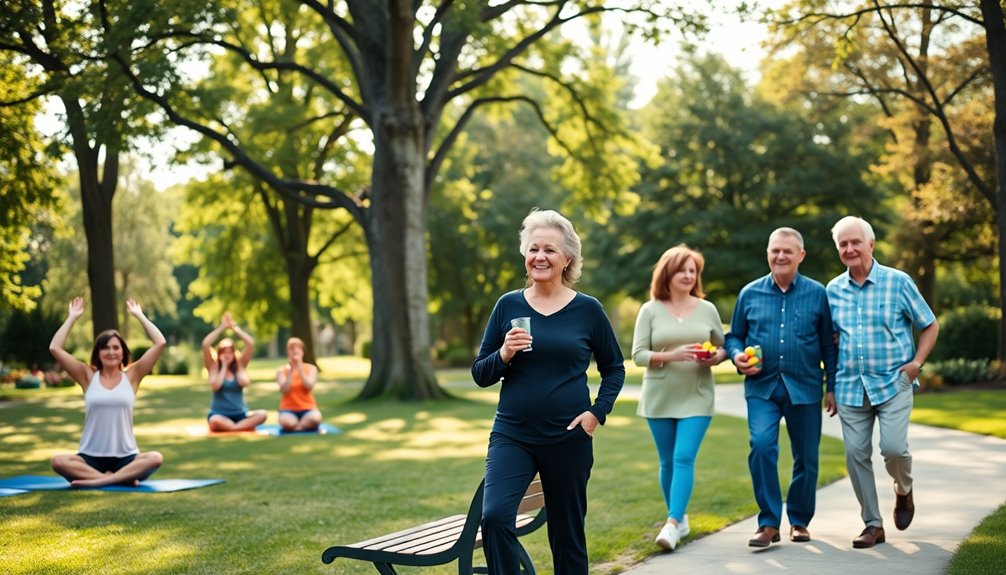
Preventive healthcare measures play a crucial role in maintaining your health as you age, helping you catch potential issues before they become serious. Regular check-ups, including annual wellness visits, are essential for monitoring your health. It's important to note that Medicare Part B covers cancer screenings like mammograms and PSA tests, as these can detect cancer early. Bone density tests are important too, especially for women over 60. Additionally, stay on top of eye and hearing screenings to manage age-related conditions, as audiometric testing is essential for accurate diagnosis and differentiation of hearing loss types.
Vaccinations are vital; annual flu shots, pneumonia vaccines, and shingles vaccines can protect you from serious illnesses. Focus on lifestyle management through nutrition, exercise, and sleep hygiene. Lastly, keep up with medication management and health education to empower yourself in managing your overall wellness effectively.
Strength Training for Seniors
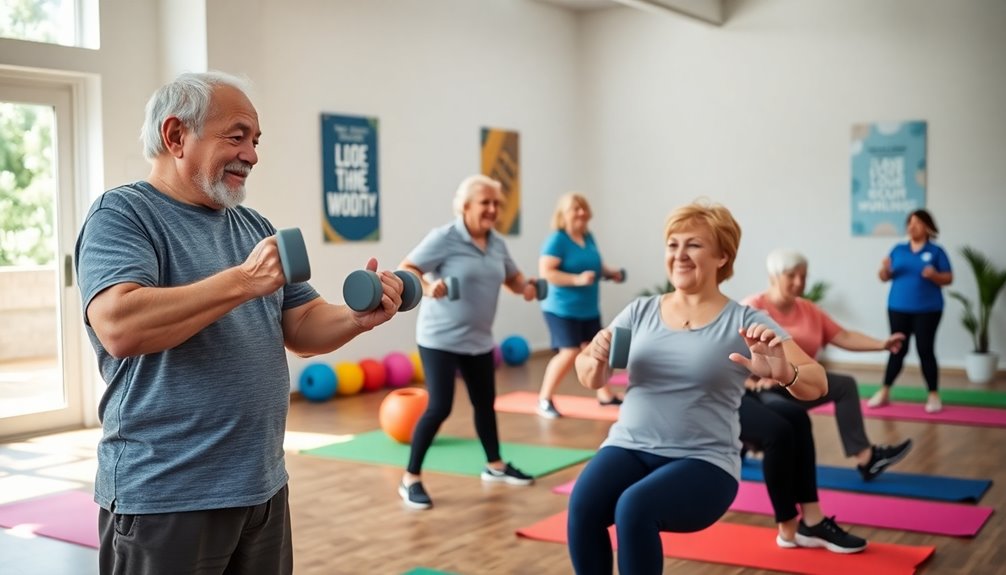
Strength training is essential for seniors looking to enhance their overall health and well-being. It increases muscle strength, making daily tasks easier and improving bone health, which reduces the risk of osteoporosis. You'll notice better balance and mobility, leading to fewer falls. Additionally, strength training lowers the risk of chronic diseases like heart disease and diabetes, while also boosting your mental health by alleviating depression and anxiety. This is particularly important as loss of muscle mass is common with aging, emphasizing the need for strength training. Engaging in regular physical activity, including effective relaxation techniques, can further support mental well-being.
Before starting, get medical clearance and consider a fitness assessment to tailor your routine. Use appropriate equipment, start with light weights, and focus on proper form to avoid injuries. Aim for 2-3 sessions per week, incorporating balanced exercises that support your goals, and monitor your progress for optimal results.
Hydration and Its Benefits

After focusing on strength training, it's important to consider how hydration plays a vital role in your overall health. Staying hydrated is crucial for maintaining cognitive function and overall wellness as you age. Since your sense of thirst may diminish, you mightn't realize when you need fluids, increasing the risk of dehydration. Proper hydration supports renal health, aids digestion, and helps prevent constipation, while also lowering the risk of chronic diseases like heart disease. Additionally, the ability to regulate water balance decreases with age, making it essential to be vigilant about fluid intake. Furthermore, engaging in regular physical activities such as strength training can enhance your hydration needs, emphasizing the importance of fluid intake during these exercises.
Aim for at least nine to thirteen cups of fluid daily, including water-rich foods like fruits and vegetables. Regularly remind yourself to drink water, and opt for appealing containers to make hydration enjoyable.
Engaging in Mind-Stimulating Activities

Engaging in mind-stimulating activities is essential for maintaining cognitive health as you age, since keeping your brain active can significantly enhance your overall mental well-being.
Incorporate memory exercises, like recalling lists or sequences, to boost your memory recall. Challenge yourself with puzzles and brain teasers to improve problem-solving skills and critical thinking. Activities that require focus can sharpen your attention, while learning new skills or a language keeps your mind engaged. Don't forget about brain-stimulating games such as chess or Sudoku for added fun. Regular cognitive engagement can lead to improved emotional well-being, fostering greater independence and mobility. Additionally, embracing an abundance mindset can transform your perception of life's possibilities, further enriching your cognitive experience.
Set realistic goals and create a varied routine that includes social interaction, making these activities even more rewarding.
Fall Prevention Tips for Home Safety

As you age, creating a safe home environment becomes crucial for preventing falls. Start by removing clutter to reduce tripping hazards and improve lighting to help you see clearly. Installing handrails on both sides of stairs adds stability, while securing rugs prevents slipping. Consider placing non-slip mats in bathrooms to reduce risks in wet areas. Regularly reviewing your medications with a healthcare provider to identify side effects like dizziness is essential, as some medications, like gabapentin, can contribute to cognitive impairment. Engaging in exercises that improve strength and balance is essential, as more than one out of four older people fall annually. Don't forget about regular vision and hearing checks. Using assistive devices like canes or walkers can enhance your stability. Finally, consider installing grab bars and night lights to further ensure your safety at home.
Frequently Asked Questions
How Can Seniors Find Suitable Exercise Programs in Their Area?
To find suitable exercise programs in your area, start by checking community centers that often offer classes tailored for seniors.
You can also connect with organizations like the National Council on Aging for local recommendations.
Don't forget to ask your healthcare provider for referrals based on your needs.
Online directories are helpful too.
Lastly, talk to friends or family who might've insights into programs they've enjoyed.
What Are Some Easy Recipes for Healthy Meals for Seniors?
When you're looking for easy recipes for healthy meals, consider options like oatmeal topped with fruits, scrambled eggs, or a refreshing fruit salad.
For lunch, try a hummus veggie wrap or quinoa black bean burrito bowls.
At dinner, whip up citrus salmon with sweet potatoes or stuffed peppers filled with your favorite ingredients.
These meals aren't only nutritious but also simple to prepare, ensuring you can enjoy healthy eating without stress.
How Can Seniors Improve Their Memory and Cognitive Skills?
It's amusing how we often forget where we put our glasses, yet we seek to improve memory!
To boost your cognitive skills, prioritize a balanced diet full of brain-boosting foods and stay hydrated. Engage in regular physical activity, like walking or yoga, to enhance blood flow and reduce stress.
Don't forget to challenge your brain with puzzles and maintain social connections; they're key to keeping your mind sharp.
What Are the Signs of Sleep Disorders in Older Adults?
You might notice several signs of sleep disorders as you age. Difficulty falling or staying asleep can lead to insomnia, while excessive daytime sleepiness may signal conditions like sleep apnea.
Early-morning awakenings and frequent nighttime urination disrupt your rest, and you might experience restless legs syndrome, causing discomfort.
Being aware of these signs can help you address any issues and discuss them with a healthcare provider for better sleep management.
How Can Seniors Engage in Community Activities Safely?
Imagine stepping into a vibrant community filled with laughter and connection, yet you hesitate, worried about safety.
Don't let fear hold you back! You can engage in community activities safely by choosing well-lit venues, participating in group events, and keeping your phone handy.
Opt for activities that match your comfort level—like walking clubs or art classes.
With the right precautions, you'll not only stay safe but also thrive in a supportive environment.
Conclusion
Incorporating these essential health tips into your daily routine can transform your wellness journey. Think of your health as a garden; the more you nurture it with exercise, nutritious foods, and meaningful connections, the more it'll flourish. Prioritizing sleep and hydration, along with mental stimulation and safety measures, creates a strong foundation for a vibrant life. Remember, it's never too late to cultivate your well-being—each small step you take can lead to a healthier, happier you.
